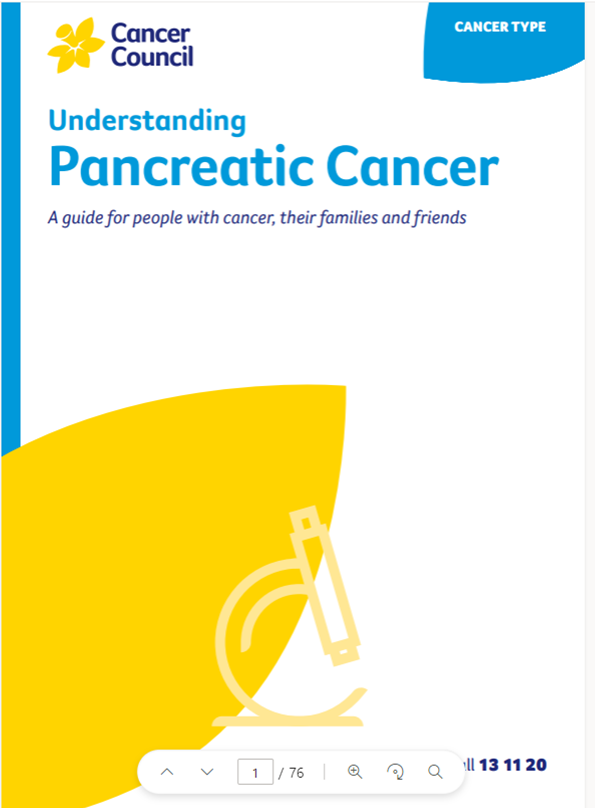- Home
- Pancreatic cancer
- Diagnosis
- Tests
- Molecular and genetic testing
Molecular and genetic testing
Each cell in the human body has about 20,000 genes, which tell the cell what to do and when to grow and divide. Cancer starts because of changes to the genes (known as mutations).
Some people are born with a gene change that increases their risk of cancer (an inherited faulty gene), but most gene changes that cause cancer build up during a person’s lifetime (acquired gene changes).
In some circumstances, your doctors may recommend extra tests to look for acquired gene changes (molecular tests) or inherited gene changes (genetic tests).
Molecular testing
If you have pancreatic cancer, you may be offered extra tests on the biopsy sample known as molecular or genomic testing. This looks for gene changes and other features in the cancer cells that may help your doctors decide which treatments to recommend.
At the time of publication (March 2024), molecular testing for pancreatic cancer is not covered by Medicare. These tests can be expensive, so check what costs are involved and how helpful it would be. If you are having molecular testing as part of a clinical trial, the costs may be covered.
Genetic testing
Your doctor may suspect you have developed pancreatic cancer because you have inherited a faulty gene (e.g. because other members of your family have also had pancreatic cancer). In this case, they may refer you to a family cancer clinic for genetic counselling and extra tests.
These tests are known as genetic or germline tests. The results may help your doctor work out what treatment to recommend and can also provide important information for your blood relatives.
Genetic counselling can help you understand what tests are available to you and what the results mean for you and your family.
Medicare may cover the costs of genetic tests or you may need to pay for them – check this with your treatment team.
→ READ MORE: Pancreatic cancer staging and prognosis
Podcast: Tests and Cancer
Listen to more of our podcast for people affected by cancer
More resources
Prof Lorraine Chantrill, Honorary Clinical Professor, University of Wollongong, and Head of Department, Medical Oncology, Illawarra Shoalhaven Local Health District, NSW; Karen Baker, Consumer; Michelle Denham, 13 11 20 Consultant, Cancer Council WA; Prof Anthony J Gill, Surgical Pathologist, Royal North Shore Hospital and The University of Sydney, NSW; A/Prof Koroush Haghighi, Liver, Pancreas and Upper Gastrointestinal Surgeon, Prince of Wales and St Vincent’s Hospitals, NSW; Dr Meredith Johnston, Radiation Oncologist, Liverpool and Campbelltown Hospitals, NSW; Dr Brett Knowles, Hepato-Pancreato-Biliary and General Surgeon, Royal Melbourne Hospital, Peter MacCallum Cancer Centre, and St Vincent’s Hospital, VIC; Rachael Mackie, Upper GI – Clinical Nurse Consultant, Peter MacCallum Cancer Centre, VIC; Prof Jennifer Philip, Chair of Palliative Care, University of Melbourne, and Palliative Medicine Physician, St Vincent’s Hospital, Peter MacCallum Cancer Centre and Royal Melbourne Hospital, VIC; Lucy Pollerd, Social Worker, Peter MacCallum Cancer Centre, VIC; Rose Rocca, Senior Clinical Dietitian – Upper GI, Peter MacCallum Cancer Centre, VIC; Stefanie Simnadis, Clinical Dietitian, St John of God Subiaco Hospital, WA.
View the Cancer Council NSW editorial policy.
View all publications or call 13 11 20 for free printed copies.

